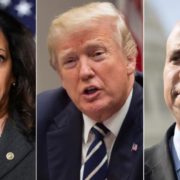In the last three days of the dramatic first week of hearings for Brett Kavanaugh, President Trump’s Supreme Court nominee, no other Senate Judiciary Committee members pressed as hard as Sens. Kamala Harris (D-Calif.) and Cory Booker (D-NJ).
In another bitter showdown over White House documents between Kavanaugh and Democratic leaders, Booker on Thursday, Sept. 6 released emails that reference Kavanaugh’s views on racial profiling and Roe v. Wade (which legalized abortion) from his time as a White House official under George W. Bush.
“I understand the penalty comes with potential ousting from the Senate,” Booker — who made it clear on the first day that he would vote no on Kavanaugh — noted on Thursday. “I openly invite and accept the consequences of my team releasing that email right now. This is about the closest I’ll probably ever have in my life to an ‘I am Spartacus’ moment.”
Many Republicans denounced Booker’s actions and accused him of “grandstanding” ahead of Booker’s possible 2020 run for the presidency
In an email Kavanaugh wrote in 2003, he expressed uncertainty about the legal strength of Roe, writing, “I am not sure that all legal scholars refer to Roe v. Wade as the settled law of the land at the Supreme Court level since [the] Court can always overrule its precedent and three current Justices on the Court would do so.”
Harris pressed then Kavanaugh on his views on Roe — and whether or not he would honor the Trump administration’s mission to overturn it.
But the nominee has refused to concretely answer specific questions by simply expressing that he understands the impact of Roe and acknowledging that the ruling is “settled law.” (It is well within the power of the Supreme Court to unsettle laws if they choose.)
Harris, who has also been rumored to run for the presidency in 2020, argued that Roe, and rulings that have affirmed it, gave autonomy to women over their reproductive systems and allowed them to maintain their privacy from the government for their health choices.
Kavanaugh also controversially referred to some birth control as “abortion-inducing drugs.”
After a fruitless back and forth between Harris and Kavanaugh, Harris asked, “Can you think of any laws that give the government the power to make decisions about the male body?”
After a long pause, Kavanaugh said he’s “not aware” of any laws that dictate decisions about “the male body.”
Late on Wednesday’s hearing, Harris also pressed the nominee over whether he has discussed the Mueller investigation with anyone, including individuals at Kasowitz Benson Torres, the firm founded by Marc Kasowitz, Trump’s personal lawyer.
Throughout the week, Democrats have been inquiring Kavanaugh about whether or not he supports Trump’s earlier claim that, if he were found guilty of wrongdoing in the investigation over Russian collusion during the 2016 presidential election, he would be immune to indictment as a sitting president.
Kavanaugh said that while he’s discussed the investigation “with other judges I know,” he said that he was uncertain he knows everyone who worked at that specific law firm.
“I’m not remembering, but I’m happy to be refreshed or if you want to tell me who you’re thinking of,” Kavanaugh told the California senator.
Harris retorted, “You’ve been speaking for almost eight hours to this committee about all sorts of things you remember. How can you not remember whether or not you had a conversation about Robert Mueller or his investigation with anyone at that law firm?”
Kavanaugh asked Harris if there was a specific person to whom she was referring, and then Harris fired back, “I think you are thinking of someone, and you don’t want to tell us.”
In July, Trump nominated his second Supreme Court choice, Kavanaugh, a U.S. Circuit Court judge, to replace Associate Justice Anthony Kennedy who announced his retirement in June.
After four days of hearings so far on Kavanaugh, the 53-year-old is poised to be confirmed by a conservative-leaning Congress before the midterm elections, despite heavy and persistent questioning from Democrats.
Democrats have been arguing to delay the hearings and the vote because of the last-minute release of 42,000 White House documents that were made available the night before the first day of proceedings. The documents are records from Kavanaugh’s time in the White House under George W. Bush.






